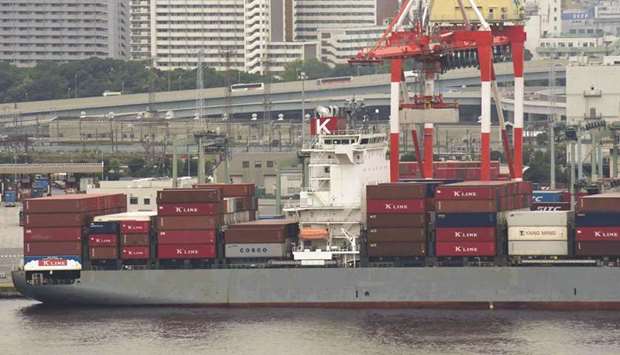Japan’s government downgraded its assessment of the economy in March for the first time in three years, blaming a bruising US-China trade war for slumping exports and industrial output.
The Cabinet Office, which helps coordinate government policy, said yesterday the economy is in gradual recovery, but exports and output are showing signs of weakness.
The monthly economic report for March was a downgrade from February, when the Cabinet Office simply said the economy is in gradual recovery.
The March report gave a pessimistic outlook, saying this bout of weakness could continue for some time in the future.
The downbeat assessment could fuel calls for the government to delay a nationwide sales tax hike scheduled for October, and increase speculation that the Bank of Japan (BoJ) will take some steps to bolster economic growth.
Exports fell for a third straight month in February and industrial output in January saw its sharpest decline in a year as tit-for-tat tariffs between Washington and Beijing slowed China’s economy and reduced demand for mobile phone parts and chip-making equipment from Japan.
The Cabinet Office downgraded its assessment of industrial production for the second consecutive month, saying it has shown signs of weakness and flatlined.
Despite the damage from the trade war, Japan’s economy should continue to grow moderately because consumer spending and capital expenditure are holding up, a Cabinet Office official told reporters at a briefing.
For March, the government left unchanged its assessment that consumer spending is recovering and capital expenditure is increasing.
However, there are concerns that companies will start cutting capital expenditure plans for fiscal 2019 in April due to uncertainty about global trade policy.
Japan’s manufacturing sector is exposed to the trade war because it sends electronic parts and capital goods to China, where they are used to make finished products destined for the United States.
The government is scheduled to raise the nationwide sales tax to 10% from 8% in October, but there are concerns this will weaken consumer spending and harm growth.
The BoJ last week cut its view on exports and output, but left its radical easing policy unchanged. Meanwhile, confidence among Japanese manufacturers hit its weakest in two-and-a-half years in March, a Reuters poll showed, as global trade friction fuelled concerns that a postwar record growth cycle driven by Abenomics may be over.
The monthly poll, which tracks the Bank of Japan’s (BoJ) closely watched tankan quarterly survey, found confidence fell for a fifth straight month while sentiment in the service sector held steady, suggesting domestic demand is unlikely to offset external risks such as the trade war and China’s slowdown.
Both manufacturers’ and service-sector morale is expected to rise just slightly over the coming three months, underscoring a bumpy road ahead for the world’s third largest economy, according to the Reuters Tankan.
The central bank will closely read the results of its official tankan due out April 1 for clues on strength of sentiment and capital expenditure at its policy meeting next month when it issues fresh economic and price projections.
The BoJ stood pat at its policy review last week, citing an economy posting gradual growth, but cut its views of exports and output due to increasing headwinds from overseas.
Slowing growth in Europe and China, the Sino-US trade war and uncertainty surrounding Britain’s exit from the European Union have strained businesses around the world.
While US President Donald Trump and Chinese President Xi Jinping appear to be closer in striking a truce in the US-China trade war, Japan’s export sector remains vulnerable to the fallout from trade friction between the world’s two largest economies.
In the Reuters poll of 479 large- and mid-sized companies, completed by 250 firms on the condition of anonymity over the March 4-15 period, managers also complained about costs of raw materials squeezing profits.
Sluggish consumer spending makes it difficult to pass on such costs to thrifty customers, they wrote in the survey.
“Our clients are turning cautions on capital expenditure due to the US-China trade war, spreading protectionism and political jitters in emerging countries,” a manager of a machinery maker wrote in the survey.
The Reuters Tankan sentiment index for manufacturers fell three points to 10 in March, with exporters of electronics, precision equipment, steel and nonferrous metals especially gloomy.
The manufacturers’ index was down 13 points from three months ago, indicating the possibility of a similarly sharp decline in the BoJ tankan. The Reuters Tankan index is expected to inch up to 11 in June.
The service-sector index held steady at 22 in March from a month earlier but was down from 31 seen three months ago, indicating a likely decline for the sector in the official tankan, which measures confidence on a quarterly basis.
The service-sector index is seen edging up to 23 in June.
The BoJ’s last tankan out in December found the business mood held steady from three months ago, but business conditions were seen worsening ahead amid trade war and slowdown in China.
The Reuters Tankan indexes are calculated by subtracting the percentage of pessimistic respondents from optimistic ones.
A positive figure means optimists outnumber pessimists.

A freighter is anchored at the international container pier at Tokyo port. Japan’s government downgraded its assessment of the economy in March for the first time in three years, blaming a bruising US-China trade war for slumping exports and industrial output.
